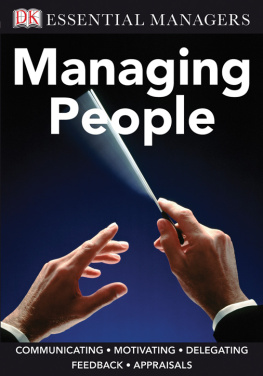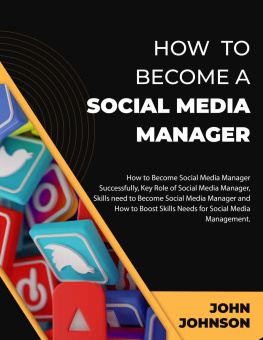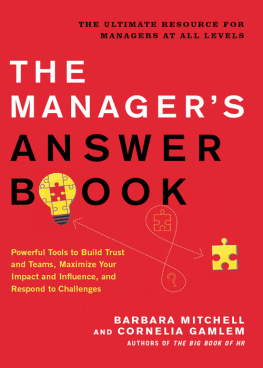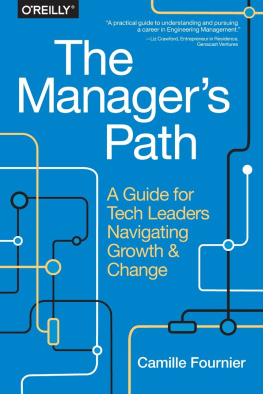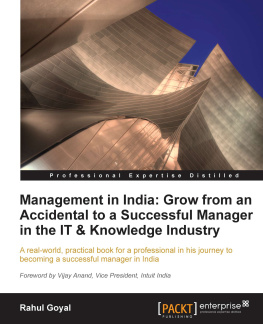BECOMING A SUCCESSFUL MANAGER
Powerful Tools for Making a Smooth Transition to Managing a Team
J. Robert Parkinson, Ph.D., and Gary Grossman

To Susan, my wife, to my twin sons, Jacob and Maxwell, and to my mother, Joan Grossman
G. G.
To Eileen, my wife and partner for four decades. It just doesnt seem possible that so much time has passed.
J. R. P.

Copyright 2010 by J. Robert Parkinson and Venn Strategy Group Inc. All rights reserved. Except as permitted under the United States Copyright Act of 1976, no part of this publication may be reproduced or distributed in any form or by any means, or stored in a database or retrieval system, without the prior written permission of the publisher.
ISBN: 978-0-07-174556-7
MHID: 0-07-174556-4
The material in this eBook also appears in the print version of this title: ISBN: 978-0-07-174164-4, MHID: 0-07-174164-x.
All trademarks are trademarks of their respective owners. Rather than put a trademark symbol after every occurrence of a trademarked name, we use names in an editorial fashion only, and to the benefit of the trademark owner, with no intention of infringement of the trademark. Where such designations appear in this book, they have been printed with initial caps.
McGraw-Hill eBooks are available at special quantity discounts to use as premiums and sales promotions, or for use in corporate training programs. To contact a representative please e-mail us at bulksales@mcgraw-hill.com.
This publication is designed to provide accurate and authoritative information in regard to the subject matter covered. It is sold with the understanding that the publisher is not engaged in rendering legal, accounting, or other professional services. If legal advice or other expert assistance is required, the services of a competent professional person should be sought.
TERMS OF USE
This is a copyrighted work and The McGraw-Hill Companies, Inc. (McGraw-Hill) and its licensors reserve all rights in and to the work. Use of this work is subject to these terms. Except as permitted under the Copyright Act of 1976 and the right to store and retrieve one copy of the work, you may not decompile, disassemble, reverse engineer, reproduce, modify, create derivative works based upon, transmit, distribute, disseminate, sell, publish or sublicense the work or any part of it without McGraw-Hills prior consent. You may use the work for your own noncommercial and personal use; any other use of the work is strictly prohibited. Your right to use the work may be terminated if you fail to comply with these terms.
THE WORK IS PROVIDED AS IS. McGRAW-HILL AND ITS LICENSORS MAKE NO GUARANTEES OR WARRANTIES AS TO THE ACCURACY, ADEQUACY OR COMPLETENESS OF OR RESULTS TO BE OBTAINED FROM USING THE WORK, INCLUDING ANY INFORMATION THAT CAN BE ACCESSED THROUGH THE WORK VIA HYPERLINK OR OTHERWISE, AND EXPRESSLY DISCLAIM ANY WARRANTY, EXPRESS OR IMPLIED, INCLUDING BUT NOT LIMITED TO IMPLIED WARRANTIES OF MERCHANTABILITY OR FITNESS FOR A PARTICULAR PURPOSE. McGraw-Hill and its licensors do not warrant or guarantee that the functions contained in the work will meet your requirements or that its operation will be uninterrupted or error free. Neither McGraw-Hill nor its licensors shall be liable to you or anyone else for any inaccuracy, error or omission, regardless of cause, in the work or for any damages resulting there from. McGraw-Hill has no responsibility for the content of any information accessed through the work. Under no circumstances shall McGraw-Hill and/or its licensors be liable for any indirect, incidental, special, punitive, consequential or similar damages that result from the use of or inability to use the work, even if any of them has been advised of the possibility of such damages. This limitation of liability shall apply to any claim or cause whatsoever whether such claim or cause arises in contract, tort or otherwise.
Contents
Acknowledgments
THERE ARE A NUMBER OF people to thank for contributing to the production of this text. First, we must thank all of the managers with whom we have been associated throughout our professional careers. They provided much of the research material that made this endeavor possible. Next, we owe a great deal to our literary agent, Jacquiline Flynn, whose thoughtful and insightful guidance led us through the publishing process. In addition, we appreciate the creative contributions of Lynn Miller and Jeff Shankerman. Finally, we owe a heartfelt thanks to our editor, Judith McCarthy, for inviting us to work with her; copyeditor Katherine Hinkebein; and the rest of the publishing staff at McGraw-Hill.
Dedication to Jack H. Grossman
You give but little when you give of your possessions. It is when you give of yourself that you truly give.
Kahlil Gibran, The Prophet
I WANT TO THANK MY friend and colleague, Jack H. Grossman, for all he contributed to this book. He is no longer with us, but his spirit lives on, and his convictions continue to be relevant.
During many years of stimulating conversation and sharing business war stories about people we knew and with whom we had worked, he helped shape many of my ideas.
Those ideasand many of his own wordsare integral parts of this book.
So, thanks, Jack. Im sure youll approve of what we have written.
J. R. P.
I AM GRATEFUL TO J. Robert Parkinson for suggesting we lovingly dedicate this book to my father, Jack H. Grossman, who coauthored the original edition. In serving as coauthor of this revised volume, I was reminded time and again of how the principles in this book were woven into the fabric of his being. Its contents reflect the type of life my father lived and the style of helpful influence he imparted to those fortunate enough to have had him as a teacher, advisor, parent, or some combination of the three.
Dad, you can rest peacefully knowing you have and will continue to make this world a better place ... forever.
Love always and forever to my father, teacher, mentor, and lifelong best friend.
Gary Grossman
A Note from the Authors
THE PURPOSE OF THIS BOOK is to help you, as a new manager, quickly assimilate some of the basic knowledge you must have and actions you must put into practice in order to succeed. For you to gain maximum benefit from the material, we recommend that you keep a managers journal. In it, note the thoughts, ideas, and insights you generate while reading. A managers journal is also an excellent place to record your completed exercises, which are presented throughout these chapters, as well as other useful reminders and information that will help you become the outstanding manager you have the potential to be.
PART I
Knowing the Territory
Congratulations on being promoted to manager! By accepting this promotion, you assumed three essential and overlapping responsibilities: to become a professional manager, to get people of diverse global and technological backgrounds and skills to fulfill their individual and departmental objectives, and to create a spirit of professionalism and teamwork within your department, wherever they may be located.
Well begin by taking a birds-eye view of what your job actually isthat is, your implied promises and obligations to your staff.



